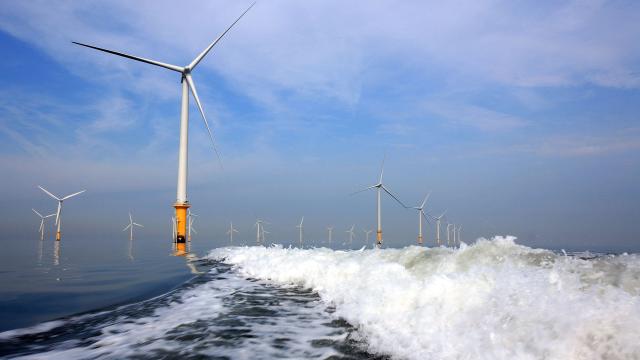The fossil fuel industry and its allies love saying that renewable energy increases utility bills. But in the UK, new research shows that coming offshore wind farms could actually make bills more affordable.
In the short term, previous renewable energy projects have increased bills because they’ve been built with government subsidies. But a study published in Nature Energy on Monday found that the country’s latest approved offshore wind projects will be built so cheaply that they’ll actually be able to pay money back to the UK government. That money will go towards reducing household energy bills.
“Energy subsidies used to push up energy bills, but within a few years, cheap renewable energy will see them brought down for the first time,” Malte Jansen, research associate at the Centre for Environmental Policy at Imperial College London, said in a statement. “This is an astonishing development.”
The researchers examined the renewable energy market in five different European countries. Specifically, they looked at government auctions of offshore wind farms between February 2015 and September 2019.
[referenced url=”https://gizmodo.com.au/2020/07/offshore-wind-is-booming-despite-the-covid-19-economic-crash/” thumb=”https://gizmodo.com.au/wp-content/uploads/2020/07/15/oxtvwbdgo114bwkuofmp-300×168.jpg” title=”Offshore Wind Is Booming Despite the Covid-19 Economic Crash” excerpt=”Globally, the covid-19 pandemic has taken a toll on nearly every industry, including wind and solar energy. But there’s a bright spot: Offshore wind has been booming, according to a new report.”]
At these auctions, offshore wind developers name the price at which they’ll sell the energy they produce to the government. If the developer’s bid is higher than the wholesale electricity price on the UK energy market, once the project goes into operation, the company receives a subsidy to achieve a competitive price. If the bid is lower, the company will pay the government back the price difference, which officials then use to subsidise household and business electricity bills ” a process known as operating with “negative subsidies.”
In September 2019, at one of these auctions, offshore wind developers in the UK claimed they could produce energy at the record low price of $US47 ($66) per megawatt hour. The researchers made projections of what wholesale energy prices will be in the UK, and found that by around 2024, that price of offshore wind energy production will allow wind farms to operate with negative subsidies for the first time in the world.
In recent years, offshore wind developers have made massive technological advancements, including developing more world’s first floating wind farm that went into operation in 2017.
The U.S. could learn a thing or two from Europe, especially since it seems the offshore wind market is resilient to the economic fallout of the covid-19 pandemic. While European offshore wind farms continue to expand a torrid pace, the U.S. currently has just one, relatively small farm in operation. The potential is there, though, with enough untapped energy to power the entire country. Investing in the technology now would be a good idea for the planet and for consumers’ pockets.
